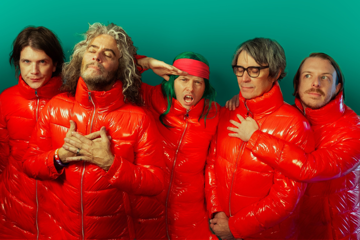A decade to the day after The Simpsons Movie's world premiere in Springfield, Vermont, we’re revisiting the long-running animated series' foray into feature-length territory with fresh eyes, to assess how well it’s held up over the past 10 years.
Although history remembers the film as being generally well received, The Simpsons Movie nonetheless polarised fans and critics alike upon its release, and a cursory glance at any fan-related forum or Facebook group shows that to hold true to this day, the film routinely drawing seemingly greater ire now than it did when it first landed. Even then, some saw the film as being ‘too little, too late’ from a show that had, in their eyes, already overstayed its welcome, while others saw it as a rejuvenation of sorts, a back-to-basics victory that reinvigorated the world’s favourite cartoon family in more ways than one. To properly understand The Simpsons Movie now, though, requires at least some peripheral understanding of the cultural climate into which it was born all those years ago.
By the time the film was delivered, several people were positing that the movie should signal the end of The Simpsons altogether.
In July 2007, the show had just finished its 18th season, airing its 400th episode (You Kent Always Say What You Want) in the weeks before the film’s release. Not always unjustly, The Simpsons had been facing broad criticism over its perceived decline in quality for several years, which can generally be traced back to about seasons 11-12 (1999-2001). This didn't happen in a vacuum, of course; at the time, the show and its writers were fighting to compete with the rise of FOX stablemate Family Guy, series creator Matt Groening’s split focus with his new project, Futurama, and the fact that South Park was shedding its largely shock humour-based roots to blossom into a gold standard for satirical adult animation.
You’d be hard-pressed to argue that, during that era, overall consistency of quality didn’t decline at least a little as a result of both external and internal forces, but it’s not like the show was rendered totally incapable of still getting it right. Still, the problems it developed — the increasingly gratuitous celebrity cameos, the underlying shift in tone, the growing focus on secondary characters — were noticeable and damaging enough that, by the time the film was delivered, several people were positing that the movie should signal the end of The Simpsons altogether.
Don't miss a beat with our FREE daily newsletter
We now know that that didn’t happen, of course — and that’s not necessarily a bad thing. While most people who decry the latter seasons of The Simpsons are not without reasons, it’s safe to say many of them haven’t really watched the show in a while, as there have actually been some surprisingly strong episodes over the past 10 years.
No, it’s not close to returning to the heights of its halcyon years, but neither is it fair to expect that it ever could. The world has changed, the culture has changed, the writers and their audience have changed — so no, obviously, The Simpsons will never again be what it was to so many during those storied ‘golden years’. But The Simpsons Movie got impressively close, all things considered. And, a decade removed from the thick of it, it's easier than ever to see that with clarity.
In no small part, this is due to the involvement of several writers who had worked on the show during its formative, best-regarded years: John Swartzwelder, the man responsible for more credited episodes than any other Simpsons writer (including several certified classics); Jon Vitti, who brought us Bart The Genius, Simpson And Delilah, Mr Plow and Cape Feare, among several others; George Meyer, the writer of Bart Vs Thanksgiving, Homer The Heretic, Bart’s Inner Child and more; long-time executive producer Al Jean and his former co-showrunner Mike Reiss, who together ushered the show into its best years through their work as overseers on seasons three and four (1991-1993 — Jean left with Reiss in 1994 to work on the short-lived The Critic, but he returned to the series in 2001); and their successor, David Mirkin, who steered arguably the two finest runs of episodes in the show's history through its fifth and sixth seasons (1993-1995).
The script admittedly tends to straddle the line between eras … But there's no denying that there are actually some truly golden, classic-Simpsons moments.
Also named on the screenplay are Groening and series producer James L. Brooks, as well as veteran scribe Mike Scully — who, as seasons nine to twelve's showrunner, is often unfairly saddled with the lion’s share of criticism over that early perceived decline in quality — and later writing hires Ian Maxtone-Graham and Matt Selman. The resulting script admittedly tends to straddle the line between eras as a result of the mish-mash of writers, and certainly has a number of gags that don’t quite land the way they should, in addition to the occasional often-flat and unnecessary line shoehorned in just to give a side character something to do.
The film is not without its head-scratchers, either: for example, the decision to replace Rainier Wolfcastle — a direct parody of Arnold Schwarzenegger — with Schwarzenegger himself as the President remains utterly mystifying to this day. Meanwhile, the inclusion of Green Day at the start of the film feels, oddly, like both a perpetuation and winking acknowledgment of the show’s celebrity problem; yes, the band appear as themselves, but they’re also killed off almost immediately when the people of Springfield — as the people of Springfield are wont to do — descend into mob rule and start pelting their floating stage-barge with trash because Billy Joe Armstrong wants to say a few words about the environment. (Although the ensuing exchange — Lisa: “I thought they touched on a vital issue!” Moe, before casually hurling a rock from his fold-out chair: “I beg to differ.” — is honestly great.)
But there’s no denying that there are actually some truly golden, classic-Simpsons moments contained amid the film’s generally ambitious screenplay; moments that are much more humorous than the oft-trotted-out ‘Spider-Pig’ gag, which, while amusing enough, is far from being the highlight of the film. It also gets pretty dark at points: for example, when Springfield turns on the Simpsons following the revelation that Homer single-handedly doomed the town to life under a giant dome, the vibe amid the horde (I told you, those people love a good mob) switches from "We just want Homer!" to fashioning nooses for the entire family, including Maggie, in frighteningly quick succession.
Additionally, there are a number of visual nods to prior jokes and scenes from the series throughout, from Scratchy’s eye bloating out on the moon echoing Homer’s run-in with a grease-trap hose in season 10’s Lard Of The Dance and Homer’s breaking of the fourth wall ("...especially YOU!") in the movie theatre recalling similar moments in early-season staples Who Shot Mr Burns? and Duffless, to Springfield’s waste problem once again resulting in mutation of the eyes, Grampa's circular floor-walk in church mimicking Homer's same movement in Last Exit To Springfield, and Bart’s nude-skateboarding sequence playing like an elongated version of Homer and Marge attempting to get home after getting frisky at the mini-golf course in season nine's Natural Born Kissers.
While we’re on the topic of visuals, it’s worth noting that the generally higher animation quality — the use of shadows, the integration of CGI, the smoother look and feel of the entire piece — is another strong point of the film, as is the overall direction from seasoned Simpsons animator and director David Silverman. His distinct touch is felt from start to finish, but is perhaps most obvious here during Homer’s ‘epiphany’ sequence, which tips its hat to another of his notable works during his tenure on the show: the hallucinatory voyage Homer undertakes in El Viaje Misterioso De Nuestro Jomer (The Mysterious Voyage Of Homer), better known as “the one with the Space Coyote”.
Other nice series homages come towards the film’s end, when Bart and Homer (finally) complete a jump over Springfield Gorge — the crashed ambulance from Bart The Daredevil still being embedded in a nearby tree is an especially nice touch — while, additionally, the shot of Homer riding off with Marge across his lap recalls both the closing scenes of Life On The Fast Lane (season one) and Duffless (season four), two iconic episodes that, like The Simpsons Movie itself, pushed Homer and Marge’s relationship to its brink before pulling them back to each other once more.
The high points truly do outweigh the low, and this is greatly helped by the consistently hilarious, excellent readings from the movie’s regular and guest cast.
As much as the movie pays tribute to the show’s narrative and visual past, it's not without its contradictory points on that same front. (Hey, you try following 18 years’ worth of episodes without running up against a few narrative walls and see how you go.) For example, Bart is wholly enthused by the idea of having Flanders for a father figure, even though season seven’s Home Sweet Homediddly-Dum-Doodily well and truly established how uneasy both Bart and Lisa are about the idea of living with the hyper-religious Ned and his family, while third-season heartwrencher I Married Marge defies the very existence of the wedding video featured as a crucial plot point in the film, let alone the presence of Marge and Homer’s relatives at their nuptial ceremony.
Nitpicking aside though, the high points truly do outweigh the low, and this is greatly helped by the consistently hilarious, excellent readings from the movie’s regular and guest cast: pre-eminently, Hank Azaria, Harry Shearer and Dan Castellaneta are all in brilliant form as their collective army of voices, regardless of whether delivering lines for a main or minor role.
(As a nameless EPA worker, Azaria’s incredulous read of “Look, look, look — we can’t keep stopping at every ‘sop’, ‘yeld’ or ‘one vay’ sign,” is perfect classic Simpsons, as is his wonderfully dismissive delivery of Chief Wiggum's "You gotta learn to listen, Lou," when his offsider suggests that mob boss Fat Tony — the also-incredible Joe Mantegna — may be trying to dispose of a dead body in the lake.)
Guest cast member Albert Brooks is, as always, an absolute delight. A repeat favourite of the show, here he features as EPA chief and primary antagonist Russ Cargill, who, pound for pound, probably has the most genuinely funny lines out of anyone in the film, and a lot of that is thanks to Brooks’ deeply funny readings thereof. His palpable enthusiasm while describing how he wants his roving death squads of tough and soft guys arranged (“Tough, tough, soft, tough, soft, soft, tough, tough, soft, soft, tough, soft…”) and ensuing matter-of-fact explanation that “of course” he’s gone mad with power are two back-to-back highlights that demonstrate both his comedic nous and the power that a good delivery has on what could otherwise be a run-of-the-mill line.
That's not to underplay the contributions of the rest of the cast, either — as Bart and Lisa, Nancy Cartwright and Yeardley Smith are as on-point as ever, while the ensemble voices from the brilliant Tress MacNeille, Pamela Hayden, Russi Taylor and Maggie Roswell are reliably great. (Sadly, the late Marcia Wallace, who voiced Mrs Krabappel, had her speaking scenes cut from the final film, though she retained a credit.) And, surprisingly, Tom Hanks makes a genuinely funny cameo as himself, which is kind of astounding given the aforementioned general ambivalence towards such appearances.
[Julie] Kavner hits it out of the park here in reminding us why [Marge is] the emotional centre of the family as well as being the superglue that holds these people together.
But it’s not just the solid jokes from where the film draws its strength, although it has them in abundance; it’s also in the emotional weight that Julie Kavner, in particular, brings to the story through her sublime performance as the long-suffering, ever-patient Marge. Although the ‘Marge finally has enough of Homer’s nonsense’ narrative has been well-trodden territory in the series, from stories such as Life On The Fast Lane and Duffless to seminal season-five episode Secrets Of A Successful Marriage and plenty of others, it’s given a little more gravitas here than we’ve seen previously, and Kavner does a simply beautiful job of conveying Marge’s genuine sadness during her farewell message to Homer, which she records over their wedding video — so much so that it makes it easy to forgive the fact that the tape shouldn’t exist (I know, I know, nitpicking…).
Perhaps more than any other of the family's members, Marge is a character that doesn’t always get fairly treated, in both an in-story and meta sense (I’ll have you know that she’s actually one of the funniest characters on the show), and Kavner hits it out of the park here in reminding us why she’s the emotional centre of the family as well as being the superglue that holds these people together, and believably selling that she’s finally reached a point where she can’t do it anymore. She is easily one of the standout performers of the entire film.
Which brings us to The Simpsons Movie’s greatest asset: the film is really about the Simpsons themselves. That might feel like a redundant statement given the title of the series, but, remember, this movie came out at a time when the show had increasingly been looking beyond its central family of five in favour of dedicating episodes to the ever-growing populace of Springfield. Sure, that was a necessary change to a point, but it often came at the expense of reminding viewers why they fell in love with the Simpsons in the first place. Even though Springfield and its populace feature heavily, and are important to the story, there’s no such issue here, as the movie injects a great deal of central sincerity and underlying sweetness amid all the wider wackiness and slapstick humour, along with a renewal of focus that gets back to the core of who the Simpsons are and why we’ve remained invested in their story over all these years.
Say what you will about the past 10 years of The Simpsons (heck, say what you will about the past two decades, if you’re feeling particularly vicious) but it’s pretty clear that, whatever its flaws, The Simpsons Movie’s cast and crew really did recapture at least some of the magic that made the show truly great in the first place in creating this film, and that’s a pretty damn remarkable feat for them to have pulled off in any capacity, much less so successfully.















